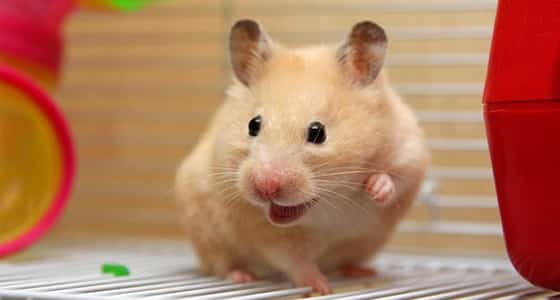
Just like us, pet rats sneeze, cough, rattle, wheeze, and hiccup now and then. It's not all the same though. There's a big difference between these conditions. For example, wheezing and rattling are quite serious health issues that can quickly become life-threatening if not treated timely and properly.
For that reason, we want to help you gain a better understanding of wheezing, rattling, sneezing, and coughing in pet rats. Yep, they can get the hiccups and develop a cough as well. So keep reading to find out more.
What's Wheezing and Rattling in Rats?
Many people confuse eye-boggling and molar bruxing with rattling. That's why we want to clear up that confusion before delving into this section.
Pet rats are prone to eye-boggling and bruxing when they are either stressed or happy. It usually manifests as short episodes of head vibration that accompany grinding noises. Nevertheless, rat bruxing may mean a range of things. Pet rats usually brux so as to grind down the razor-edged ratty incisors. As their teeth grow, rats are simply forced to wear them down somehow.
That's why it's recommended to keep a lot of chewing materials inside the cage. In the fancy domesticated rats, bruxing frequently go together with boggling. As a rat starts boggling, the particular muscle connected to the jawbones begins to loosen and tighten at once. Since that muscle stretches out to the eye sockets, this gets the rat's eyeballs to jiggle and/or bounce rapidly. This is how eye-boggling appears.
On the other hand, rattling is a serious condition that's a sign of an advanced lung disease or respiratory infection in most cases. It's characterized by sounds that are reminiscent of baby rattles or somebody with severe chest congestion. Rattling requires dust- and pollution-free environment along with immediate antibiotics to get treated successfully.
With regard to wheezing, it relates to the whistling noise caused by your rat's breathing. Even though wheezing and rattling often go hand in hand they don't always occur together.
More often than not, wheezing in rats is a sign or symptom of a newly-formed respiratory infection. Sometimes it is associated with a mycoplasma flare. Just about any rat gets some form of myco flare during life. As a matter of fact, mycoplasma infection can be either mild or very serious. This is where antibiotics come in.
Be sure to use antibiotics, not abuse them. That means you should use medicines only when it is really necessary. Otherwise, it may bring about antibiotic resistance in rats. Let the immune system of your rat manage this condition on its own. If it lasts longer than two days and the things are getting worse as time progresses, you are advised to start administering antibiotics as soon as possible.
Is My Rat Sneezing?
Have you ever heard your rat to make a noise that sounds like a high-pitched “pchhttt?” That may indicate the rat sneezing. However, don't take this for granted since a wide variety of factors can cause the rats to sneeze. For instance, sneezing may result from the influence of:
- Different illness
- Allergies
- New pets
- New scents
- Seasonal changes
- Sniffing around
Whatever the case may be, sneezing is often accompanied by porphyrin, a parent compound that gives rise to bloody colored secretions. While a slight amount of this chemical compound pertains to irritation, a buildup usually means a serious lung infection like urinary infection, mycoplasma infection, inner or middle ear infection, and advanced pyometra. In case of a minor bacterial infection, the treatment is not required at all. Most owners don't know that their pet rats have ever been sick.
By contrast, some illness can be very serious so that the rats fail to survive or recover. Proper diagnostic and testing is key. Keep in mind that unnecessary and frequent drug use increases the risk of drug-resistant bacteria.
Likewise, sneezing can mean your rat has developed allergies. So, let’s take a look at some of the most common cases.
Rat sneezing caused by an illness
Does my rat sneeze because he/she is sick? Continuous sneezing is oftentimes an indication of an illness. If so, you'll probably notice symptoms like bad appetite, changes in activity, rattling, and discharge from the nose and eyes. These accompanying symptoms are commonly followed by the overall appearance of weakness or discomfort.
Unfortunately, pet rats are facing various health issues, such as urinary tract infections and hematuria, quite often as they get older. Internal parasites like protozoan and worms, as well as external parasites like fleas and lice, can also cause different diseases and health issues. This especially applies to rats bought at pet stores and poorly bred rats. Young individuals are generally healthier and more resilient. They have a playful attitude and temperament, well-groomed coat, clear bright eyes, porphyrin-free nose, wheeze-free breathing, and ideal body weight. So, it's not difficult at all to distinguish sick from healthy rats.
Sneezing caused by allergies
Many rats are inclined to develop allergies in certain circumstances so this should not catch you by surprise. How to recognize it?
Just like humans, rats may have different allergic reactions to various things within their environment.
When rats have an allergy, they are sneezing quite frequently at varying times. If your rat has begun to sneeze not long ago and you've recently changed his bedding, food, or added some new items in the rat cage, chances are that they contain allergies. How to help you rat stop sneezing?
One of the first things you can do is to eliminate all suspicious items from your rat's environment and diet or replace them with items that are proven to be 100% hypoallergenic. For instance, you can use cotton towels that are washed in dye- and fragrance-free laundry detergents (like Dreft detergent) in lieu of bedding.
That can do the trick in most cases. If you plan to change bedding in the cage anytime soon, make sure your rat is not allergic to it. That's very important because any change of bedding can cause sneezing.
Different beddings have different dust levels. Kaytee and Carefresh beddings have emerged to be good options. On the contrary, wooden shavings are dangerous for most pet rats as they cause flares and other health problems. That’s why you should avoid them.
For example, pine wood shavings oftentimes contain a lot of dust, thereby increasing the likelihood of getting respiratory distress. Cedar shavings can be noxious or toxic to rats. However, this mostly depends on the rat’s sensitivity.
Be sure to switch bedding brands if sneezing tends to continue and get worse.
Sneezing due to new scented oils, candles, air fresheners, and pets
All of this can trigger sneezing. A new animal, such as a dog or a cat, can induce it when getting into the rat's environment. While the rats can quickly get used to new animals in the home, they may never become accustomed to those smells in the air.
The same holds true for air freshener, oil warmers, oil diffusers, candles, incense, and wax melts. They all can irritate the respiratory system of your rat and make it a bit sick. Not all rats get irritated easily. As stated earlier, the very sensitive individuals, as well as those who're already sick, are at a higher risk for respiratory irritation.
Essential oil diffusers are growing in popularity these days. Despite the fact that they may have some therapeutic effects on humans, be careful about diffusing those oils. We don't recommend using them because the respiratory system of pet rats is rather frail, which increases the risk of adverse reactions.
Is My Pet Rat Coughing?
The vast majority of rats don't necessarily cough. With that being said, the coughing behavior in rats is typically a consequence of shortness of breath or labored breathing. This way your rat wants to say: “Please get me to the veterinarian for antibiotics.”
Some rats develop a cough when they have a choke, which often gets them to jump backward or forward. That triggers tickling in their throats so that they choke up
when eating too fast. In most cases, rats are capable of clearing it up before we become aware of what happened to them.
Is My Rat Getting the Hiccups?
Many people believe that their rats get the hiccups from time to time. The hiccup behavior commonly happens right after waking. When waking up, some pet rats hiccup because they put an extra effort into preparing their body for daily activities — potentially the lungs and heart.
Rats may produce a sound that is very similar to hiccups when they face breathing issues. We would consider it a respiratory infection rather than hiccups.
You should try to determine the cause anyway. Remember that correct diagnosis is one of the first steps to effective management of a disease or condition in pet rats. Just as with humans.



